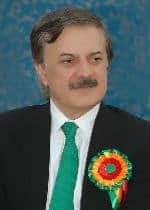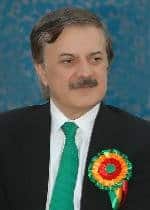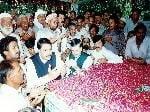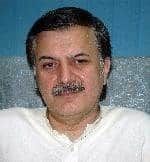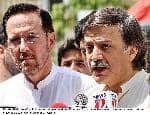Former Federal Minister Of Commerce
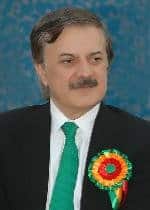
Humayun Akhtar Khan is a Pakistani politician. He has been elected as a Member of the National Assembly four times and served as the Federal Minister for Trade and Commerce from 2002–2007 and as Chairman Pakistan Board of Investment from 1997-1999. An Actuary by profession, Humayun Akhtar is one of the few Pakistani politicians with a solid understanding of the economic problems facing the country and his ideas have been published in a manifesto called the Road Map to Pakistan’s Recovery. His father General Akhtar Abdur Rehman was the Director General of the ISI during the 1980s and played a crucial role in forcing the Soviets out of Afghanistan. Humayun’s family is one of the most influential business families in Pakistan and collectively owns Tandlianwala Sugar Mills, Superior Textile Mills, and the Pepsi Franchise.
An actuary by profession, economist by education and entrepreneur by inclination, Humayun Akhtar belongs to the breed of politicians that came to the fore when a spirited democracy faced challenges of political compromise, institution-building and modernization. Having been elected in four national assemblies, Humayun is counted among Pakistan’s most progressive politicians. In addition to being considered for the country’s premiership, his crowning achievements have been introducing a new investment policy as Minister of State for Investment and achieving record trade numbers later as Pakistan’s Federal Minister for Commerce.
Humayun Akhtar Khan’s father was the late General Akhtar Abdur Rahman Khan, the Director General of Pakistan’s Inter-Services Intelligence in the 1980s and among the most crucial figures of the Afghan jihad campaign in the days of the Soviet invasion. After his father’s sudden demise in the infamous plane crash carrying General Zia and his top leadership on August 17, 1988, Humayun decided to return to Pakistan and enter politics. His three brothers followed suit and started businesses in Pakistan.
Education
Humayun Akhtar received his early education from Army Burn Hall College, Abbottabad and secondary education form Saint Mary’s Academy, Rawalpindi. He got a Bachelor of Science degree in Mathematics from Government College University, Lahore and later traveled to Canada where he got a Master of Science degree in Actuarial Science from University of Manitoba. He is a fellow of Society of Actuaries, USA and the Canadian Institute of Actuaries, the highest professional designations required to become a Actuary.
Business
From 1981-1987 Humayun Akhtar worked for an insurance firm called Morneau Sobeco Income Fund in Toronto as an actuary. Shortly after his father General Akhtar Abdur Rahman died in the plane crash that also killed General Zia-ul-Haq, Humayun along with his brothers decided to move back to Pakistan. After years of professional experience in foreign corporations, the Akhtar Brothers bought the Pepsi Franchise upon their return to Pakistan. They have taken the franchise from near bankruptcy to being the standout company in the beverage industry. Success in Pepsi was followed by expansion into the sugar and textile industries. Today, Tandlianwala Sugar Mills Ltd is one of the largest producers of sugar in the country with units in Tandlianwala, Muzaffargarh, and Dera Ismail Khan.
Politics
Early Years
In 1990, Humayun Akhtar joined Pakistan Muslim League (N) which was part of a greater electoral alliance consisting of Conservative parties called Islami Jamhoori Ittehad. In the 1990 general elections, he contested from NA-92 in Lahore and with the support of voters who remembered his father as a hero for his role in the Afghan Jihad, he comfortably won his first election. For three years he served as a member of the national assembly but when Nawaz Sharif resigned along with President Ghulam Ishaq Khan in 1993, assemblies were dissolved new elections were scheduled. In October 1993 general elections took place once again in Pakistan. Humayun was once again given a PML-N ticket from Lahore but this time, it was from NA-93 against PPP stalwart Aitzaz Ahsan. It was a constituency that had always been a Peoples Party stronghold as its founder Zulfikar Ali Bhutto had won from there and this was Humayun’s toughest test to date. However, despite the fact that PPP won the election and Aitzaz Ahsan was one of its central leaders, Humayun pulled off an impressive victory in what was a close contest. His brother Haroon Akhtar Khan also contested that same year and defeated Qasim Zia for a seat in the Punjab Assembly. For three years Humayun sat on the opposition benches in the National Assembly until when President Farooq Leghari dissolved Benazir Bhutto’s government on charges of corruption in 1996. In 1997, new elections were called for after the ouster of Benazir Bhutto’s government.
In 2002, General Pervez Musharraf who by then had also become the President of Pakistan promised that there would be General Elections in October. Because Nawaz Sharif had been exiled to Saudi Arabia, many of his most prominent party leaders including Chaudhry Shujaat Hussain, Chaudhry Pervaiz Elahi, Ijaz-ul-Haq, Khurshid Mahmud Kasuri, Shaikh Rasheed Ahmad, Mian Azhar and Humayun Akhtar Khan formed a new party called Pakistan Muslim League- Quaid-e-Azam. Humayun contested from constituency NA-125 which was in fact part of what was once called NA-93, the constituency he won from in 1993. This time his main opponents were Akram Zaki of PML (N) and Naveed Chaudhry of PPP. Although many political analysts believed that it would be a one sided affair in favor of Humayun who was very popular in this constituency, it turned out to be a very tough election as the Muslim Leagues vote was split and Humayun won by an extremely narrow margin. The runner-up Akram Zaki claimed victory and stated that the result had been rigged in favor of the PML-Q candidate. Zaki took the result to the Lahore High Court and Supreme Court of Pakistan but after a recount it was concluded that Humayun had won fair and square. He was then sworn in as the Commerce Minister in a cabinet led by Prime Minister Zafarullah Khan Jamali. In 2002 when PML (Q) was forming its government, Humayun Akhtar was one of the candidates considered for the post of Prime Minister. However, President Musharraf and the PML-Q eventually decided to choose the Prime Minister from one of the smaller provinces and hence gave the honor to Zafarullah Khan Jamali of Balochistan. By early 2004, it was clear that Jamali had fallen out of favor with President Musharraf and his own party members. Jamali did not support Musharraf’s decision to keep on his uniform amongst other things while Musharraf was fed up of Jamali’s incompetence and poor governance. By May 2004, the party decided to sack Jamali and in his place a number of potential candidates were listed. After many high level consultations between the President and his close political and military aides, it was decided that Humayun was the best choice to lead the nation. Although Humayun had the backing of the Pakistan Army, his own party men the Chaudhrys of Gujraat proved to be the last hurdle in his nomination as they fought tooth and nail to ensure that he does not become the next Prime Minister. Party President Chaudhry Shujaat went to the extent of asking Musharraf to delay the announcement of the new Prime Minister by three weeks till the budget session concludes. Many political analysts believe that the main reason behind the delay was to postpone Humayun’s candidacy as the Chaudhry’s felt that he had intentions of hijacking the party from them and as a result threatening Pervaiz Elahi’s own political ambitions of eventually becoming Prime Minister after the next election. Eventually Musharraf adhered to the pressure and the only other viable option for Musharraf was Finance Minister Shaukat Aziz who was a Senator, not a Member of Parliament. Eventually, Chaudhry Shujaat Hussain was made interim Prime Minister for two months and it was decided that Shaukat Aziz would contest an election for the national assembly via by-election. Shortly after contesting and winning the by-election, Shaukat Aziz replaced Chaudhry Shujaat as Prime Minister. After the new Prime Minister was chosen and Humayun was denied the opportunity to lead the nation, he resumed his duty as the Commerce Minister. During his tenure, he undertook policies which would turn Pakistan into a dynamic world economy. He actively participated in the World Trade Organization negotiations, where he was selected as a facilitator for the Hong Kong ministerial conference held in December 2005. He also introduced reforms in the insurance sector and enacted copyright laws in 2007. Recently he helped establish the Lahore Agenda for Farmer’s rights to global markets in the 31st meeting of Cairns Group. During his five year tenure as the Commerce Minister, Pakistan’s average Real GDP Growth rate was 6.8% per year, exports increased from $8 Billion to $20 Billion, and the US Dollar exchange rate was 62 Pakistani Rupees. In November 2007, he completed his term as the Federal Minister for Trade and Commerce. After the PML-Q completed its five year term in power, general elections were announced. After the Lal Masjid incident and the sacking of all the supreme court judges via the PCO, President Musharraf was under intense pressure to shed his uniform and contest his third term as President as a civilian rather than a dictator. After winning his election, Musharraf shed his uniform and allowed opposition leaders Nawaz Sharif and Benazir Bhutto to return to Pakistan and contest the upcoming elections. Despite all this, many pundits still believed that the PML (Q) had a chance to be in power once again due to all the development projects that took place during the PML (Q) government.
Formation of Likeminded Faction
While the PML-Q sat in the opposition, and became increasingly weak, and being taken decisions by the party only Chaudhry Shujaat Hussain and Chaudhry Pervez my God. Opposed many of the influential members of the party, including Humayun Akhtar these measures, and tried to settle their cases with the Chaudhry brothers, through dialogue, but Chaudhry refused to loosen its grip on the party. This frustrated many in the party who were opposed to the idea of family policy, especially when cooperation with the Chaudhry was more responsible than a source of strength for the PML-Q candidates in previous elections. Led a group like-minded in the party when the time comes for elections within the party, by Humayun Akhtar Hamid Nasir Chattha, and Salim Saifullah Khan boycotted the elections and some members of the Election Commission in the PML-Q for the year 2006 that have changed. In the end, Shujaat was re-elected President of the PML-Q, while Mushahid Hussain was re-elected Secretary-General in elections boycotted by many of the most influential party leaders. Based on that, and the split PML-Q and the faction of like-minded special election in which it proclaimed Salim Saifullah as its President, and Secretary-General Humayun Akhtar them. He joined many of the courageous men, including the League Muslim Khurshid Mahmud Kasuri, Hamid Chattha Nasser, and Gohar Ayub Khan, a breakaway faction while others, including the Sheikh Rashid Ahmed, Ijaz ul-Haq formed groups separate their own League Muslim. This left the Great Schism in the PML-Q former ruling party in a state of chaos. Decided in May 2011, and a faction of the PML-Q led by Chaudhry Shujaat Hussain to join the Government of Pakistan People’s Party, while “their ilk” group continued to sit in the opposition in each of the National Assembly and the Senate. Similarly, in the General Assembly of Punjab, joined the European Union unification of PML-N in the government while the rest of the PML-Q sat on the opposition benches. This was the first time in the history of Pakistan that some members of one party in parliament and sat on the opposition benches while others sat on the seats in the cabinet. Although the PML-Q has more members in the National Assembly, and the group has more members of their ilk in the Assembly of Punjab and Sindh Assembly. Is seen on a large scale that decided to PML-Q to support the federal government in order to save Pervez Chaudhry Moonis divine divine son of the trial in a corruption scandal NICL. Chaudhry’s decision to join the government in order to get Moonis of divine justification for prison policy position against the family that have been taken by their fellow members of the group in 2009. As of May 2012 and formed a group like themselves in alliance with the PML (N) in an attempt to unite all factions League Muslim under the leadership of Nawaz Sharif, in order to defeat the PTI and the ruling coalition, the Pakistan Peoples Party and Pakistan Muslim League (o) in the elections the next general.
In Power
He elected as member of National Assembly in 2002 elections from NA-125 , Lahore-VIII
Current Status
Areas of Legislative Interest
• No Area of Interest
Membership of National Assembly Committees
• Standing Committee on Commerce (Ex-Officio)
Hamayun Akhtar Khan Pictures
|
|
|
| ||||||||
|
|
|
| ||||||||
